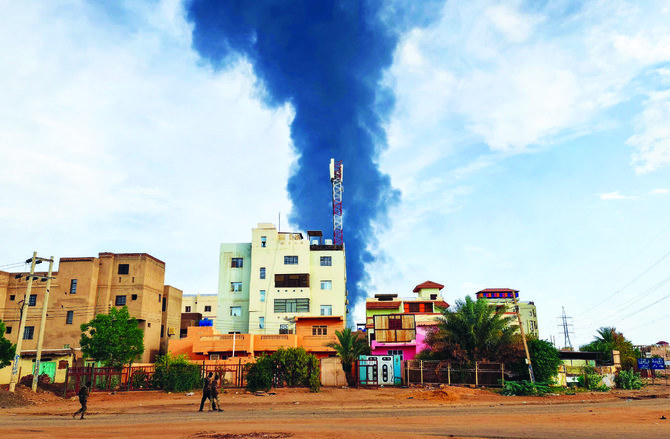KHARTOUM: The Sudanese capital Khartoum was relatively calm on Saturday morning as a US and Saudi-brokered 24-hour ceasefire took effect, providing a window for humanitarian assistance and giving the public a break from the intense fighting.
The short ceasefire follows a string of violated truces between Sudan’s army and the paramilitary Rapid Support Forces, whose power struggle erupted into violence eight weeks ago, sparking a humanitarian crisis.
The US and Saudi Arabia said they shared “frustration” over the violations in a statement announcing the latest truce, and they threatened to adjourn the talks, which have continued indirectly, if fighting continues.
The fighting which began on April 15, has turned the metropolitan area including Khartoum and its sister cities Bahri and Omdurman into a war zone, and led to conflict in Sudan’s Darfur and Kordofan regions to the west.
Before the start of the truce at 6 a.m. (0400 GMT), residents reported anti-aircraft missiles firing in southern Khartoum and the Sharg El-Nil district across the Nile, which also saw airstrikes.
The fighting has displaced more than 1.9 million people, 200,000 or more of whom have crossed the border into Egypt.
Those who have taken the long journey have complained of poor conditions and long wait times.
On Saturday two people attempting to cross the Ashkeit border crossing said a new rule had come into effect requiring all Sudanese to obtain a visa before entering Egypt.
The Egyptian Foreign Ministry did not respond to a request for comment on the decision, which is a reversal of a previous agreement between the two countries that had guaranteed children, women and elderly men free movement.
“We spent two nights in the neutral territory and now they are turning us back,” said Sundus Abbas, a doctor speaking to by phone from between the countries’ checkpoints. “Some people are refusing to leave,” she said.
In the week since the last ceasefire lapsed on June 3 there has been intense fighting, including around crucial army bases, with the RSF claiming to have taken control of an arms manufacturing complex in southern Khartoum.
The US State Department said late on Friday it was supporting a platform called the Sudan Conflict Observatory which would release results of satellite monitoring of the fighting and ceasefires.
An initial report by the observatory documented “widespread and targeted” destruction of water, power and telecom facilities.
It also documented eight “systematic” arson attacks that razed villages in Darfur and several attacks on schools, mosques and other public buildings in El Geneina, country’s westernmost city, which has seen fierce militia attacks amid a telecom blackout.
A doctors’ union in the city called it a “ghost town” and alleged several human rights abuses, including blockading the city, depriving civilians of water, and killing the elderly.
Citizens have said that some of the men who have attacked the city wore RSF uniforms.
More than half of Sudan’s population will require aid this year due to the fighting, the UN has said, as most hospitals in conflict areas have stopped functioning and food supplies in many areas are dwindling.
Previous ceasefires had allowed some humanitarian access, but aid agencies reported still being impeded by the fighting, bureaucratic control and looting.
Medical aid agency MSF said on Saturday its staff had been stopped by RSF soldiers and “obliged” to make a statement that was later circulated by the forces.
The fighting derailed the launch of a transition toward civilian rule four years after a popular uprising ousted strongman President Omar Bashir.
Sudan’s army and the RSF, a parallel force that has operated legally since 2017, fell out over plans to integrate their troops and reorganize their chain of command as part of the transition.


























